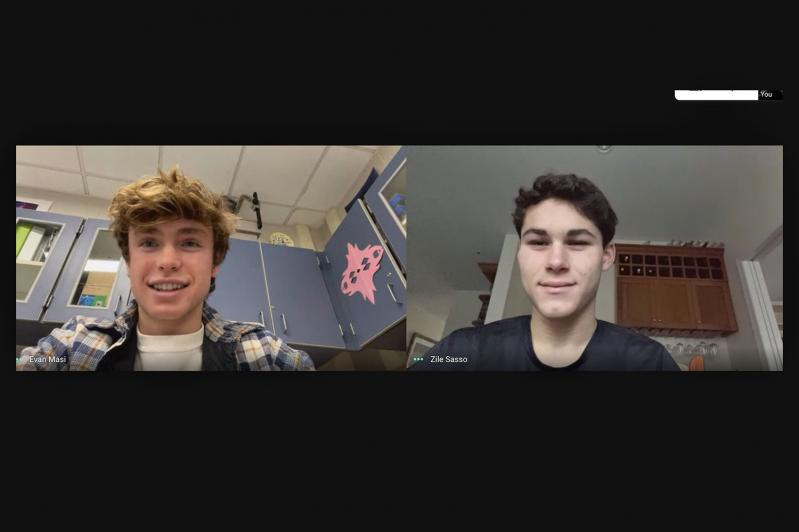The pandemic, the 2020 election, the former President Trump's impeachments, Supreme Court appointments, the Capitol riot -- these events are the kind of stuff that history textbooks are made of. But today's students aren't waiting for it all to be written down before they study it in the classroom. Many are watching and learning as history unfolds before their eyes, often in a controversial way.
These "teachable moments," to borrow a phrase often used by teachers themselves, have been coming in fast succession.
"It's all curriculum. Everything is open for me to discuss," said Billy Barbour, who teaches advanced United States history and government classes at East Hampton High School. "It's important for me to try to present the circumstances and help them analyze it without driving their opinion. . . . I'm not really interested in trying to make people one side or the other."
His colleague Devon Parkes, who is the social studies department coordinator at East Hampton High School, said students "very much want to know the facts," whereas that's not always the case for adults.
"An election year always provides us with a lot of commentary. In this particular year it's given us a lot more. . . . I had an Advanced Placement student joke that I was orchestrating incidents in Washington, D.C., to bring into the classroom," Ms. Parkes said.
She recently offered a lesson on Andrew Jackson, who was president of the United States between 1829 and 1837, and whose terms in office were also characterized by major events such as the relocation of indigenous Americans from their native lands and the rise of the abolitionist movement. Daniel Feller, a University of Tennessee history professor who has written extensively on President Jackson, has said that he "entered the White House with an uncertain policy agenda beyond a vague craving for 'reform' " and that "under the guise of reform, many offices were doled out as rewards for political services."
Sound familiar?
"I really think it's appropriate, and I think it's necessary, to learn as much as possible," said Dante Sasso, a junior at East Hampton High School who takes Ms. Parkes's A.P. U.S. history class, which is lovingly referred to as "APUSH."
"One of the things I love about U.S. history in general is being able to connect it to what happened before. . . . It makes kids want to learn more when you can have that interplay between what's happening in our world and studying what happened before," Dante said.
The New York Times reported earlier this week that this type of real-time learning is happening all over the nation, though "schools occupy a fraught political space," The Times reported. "The ways that children learn history, civics, and literature can shape the votes they will one day cast. Teachers work hard to ensure their classrooms are safe for everyone to express opinions and disagree."
Evan Masi, an East Hampton junior who also takes A.P. U.S. history, said he likes that he and his peers have "pretty long conversations" about "very big events." No subject is taboo, he said, no matter how complicated.
"A big part of the curriculum is making connections. . . . As long as we're not attacking certain people, it's a great space for us to talk and ask questions," Evan said.
"It's hard to go anywhere without hearing about what Trump was doing and what Biden was doing," Evan later continued. He said classroom discussions make it easier to process what's going on around him. "It feels like a natural conversation you're having with your teacher, but then you realize the whole time you've been learning all this subject material."
Sometimes it's awkward, Ms. Parkes said, but it's necessary to instill in students a fluency in the language of politics so they can become responsible adults.
"It's difficult for students because their beliefs might not necessarily match up with their family's beliefs," she said. "Talking about politics in general can be uncomfortable for many students. That's why we encourage them to come down to the facts. You don't have to always display your opinions, but you can understand the facts of the process and the facts to back it up."
Teachers find themselves being careful to keep their own political views out of their lessons.
For weeks during the 2020 election cycle, said Mary Jo Walker, who teaches history at the Montauk School, the students "kept trying to guess who I was voting for. I said, 'You're never going to get it out of me. I'm not here to tell you my opinion -- I'm here to help you find your own.' "
Mr. Barbour said that "different circumstances present different challenges, and passions can tend to run pretty high. I try to make sure that I teach it, not preach it."
Ms. Walker recently taught her students about the controversial election of 1876, in which many Electoral College votes were called into question. In 1877, Rutherford B. Hayes, a Republican, was installed in the White House despite his opponent, Samuel J. Tilden, a Democrat, having won the popular vote.
Anyone who followed politics in 2016 and 2020 might think that, too, sounds familiar.
"I had a student say to me the other day, 'In 20 years, when this is in our textbooks, do you think it will be a blurb or a whole
chapter?' " Ms. Walker said. "They've recognized that this is tremendous right now in our world."
For reasons not specified, senior school administrators from two other local districts declined to allow history teachers to give interviews for this story.
What's important for people to realize, Mr. Barbour said, is that the students of today are the political leaders of tomorrow.
"I always tell people that I know that the younger generation tends to get a bit of a reputation," he said, "but from what I have seen, the future of the republic is in good hands."

